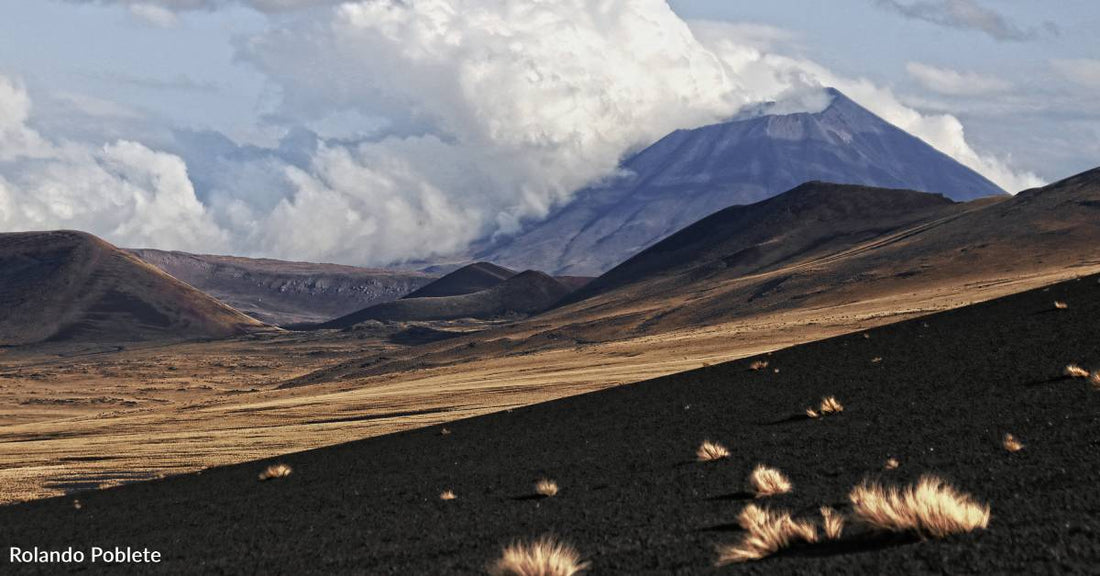With Your Help, We've Expanded a Reserve in Argentina, and We're Not Done Yet
Michelle Milliken
The Payunia Provincial Reserve in Argentina’s Mendoza province is home to a wide range of wildlife, including pumas, endangered Andean cats, and Andean condors. Since 2018, we’ve been working with Greater Good Charities and WCS Argentina to expand the park, through land purchases and through compensating livestock producers for their grazing rights. We’re closing in on adding another substantial parcel to this important protected area.
The parcel in question is a ranch that provides significant wintering habitat for guanacos, ungulates from which modern-day llamas descended. The guanacos in the area make up the largest migratory herd in the world. To help secure their wintering grounds, we’re working to add the current ranch land onto the core area of the reserve.
 GUANACOS IN PAYUNIA. PHOTO: ROLANDO POBLETE
GUANACOS IN PAYUNIA. PHOTO: ROLANDO POBLETEMartín Funes, Terrestrial Protected Areas Manager for WCS Argentina, explains, “The ranch, at 100,000 acres, represents the prime wintering ground of the guanaco migration in Payunia, the most massive migration in the species range in South America. Thus, conserving the ranch will ensure the long-term conservation of a vital component of one of the most globally endangered biological phenomena, that of ungulate migrations.”
Funes says the purchase will be done in two phases, the first of which is expected to occur in the next two months, after a property survey is conducted and approved by the Lands Office. The second phase is currently being scheduled for May 2024.
While the current purchase focuses on the guanacos’ wintering range, prior protections focused on their summer range. This involved 79,000 acres on which retiring livestock producers were compensated for relinquishing their grazing rights, The rights were then returned to the province, which promised to ban livestock production on these lands. The presence of livestock in the area has required guanacos to compete with them for food and water. There have also been retaliatory killings of Andean cats that preyed on young goats.
Our work in Argentina goes a bit further, too, with a prior purchase much like the one currently being undertaken. Between 2018 and 2019, at the same time the grazing rights were being addressed, we teamed up with WCS to purchase 25,000 acres of another private ranch, which were then donated to the province of Mendoza.
 PAYUN LISO VOLCANO. PHOTO: ROLANDO POBLETE
PAYUN LISO VOLCANO. PHOTO: ROLANDO POBLETEThe goal of these efforts is not only to protect important habitat for guanacos, or to protect predators from retaliatory killings, but also to boost diversity.
When speaking about the project last year, GreaterGood CEO Tim Kunin said, “By removing cattle and sheep from these ranches, that will increase the variety of natural wildlife. And then that increases the viability of predation. In this case, the reason WCS identified these particular parcels was because it’s the largest migratory guanaco herd in the world."
He adds, "So much of wildlife protection seems to be about helping an individual animal, but the way that you protect animals long-term is to protect the habitats that provide the space for wild animals to be preserved and to have enough genetic diversity, particularly among predators, so it can't be small areas because there won't be a large enough area for a diverse group of predators to have a genetic diversity over time… You need expansive areas to be able to do that.
"And that also connects to the goals about protecting 30% of the world’s surface."
With your help, we've been able to work toward these goals. To see some of the animals that call the region home, keep scrolling.
 ANDEAN CAT. PHOTO: JUAN REPUCCI
ANDEAN CAT. PHOTO: JUAN REPUCCI PUMA. PHOTO: MARTIN PEREZ
PUMA. PHOTO: MARTIN PEREZ ANDEAN CONDOR. PHOTO: MAXIMILIANO TRONCONI
ANDEAN CONDOR. PHOTO: MAXIMILIANO TRONCONI
